Category: Toronto AI Organizations
L’INSTITUT VECTEUR INAUGURE SON PROGRAMME DE STAGIAIRES DIPLÔMÉS
Written on . Posted in Toronto AI Organizations, Vector Institute.
Le 1er février 2018
L’Institut Vecteur tient à féliciter les membres de la première cohorte de son Programme de stagiaires diplômés. Ce programme lancé cette année se veut un catalyseur de collaboration entre les étudiants et les chercheurs spécialisés en apprentissage profond, en apprentissage automatique et, plus généralement, en intelligence artificielle. Il vient compléter d’autres programmes semblables qui verront le jour dans les établissements d’enseignement et les entreprises technologiques afin de favoriser un climat de collaboration propice au partage des idées et de l’expertise au sein de l’Institut Vecteur. La première cohorte est représentative des forces vives en présence dans les établissements et les universités de l’Ontario. On y trouve des étudiants à la maîtrise, des doctorants et des stagiaires postdoctoraux qui suivent de nouvelles pistes de recherche en apprentissage profond ou en apprentissage automatique.
Les candidats ont été évalués et sélectionnés en fonction de l’importance de leurs contributions antérieures à la recherche et de l’adéquation de leurs champs d’intérêt avec la vision, la mission et les capacités de recherche de Vecteur. Les étudiants retenus toucheront des honoraires en contrepartie de leur participation aux événements et aux activités de l’Institut. Devant le calibre élevé de cette première fournée, l’Institut espère enrichir et élargir le programme en 2019. La période de mise en candidature débutera vers la fin de l’année.
MEMBRES DE LA COHORTE 2018
● Ahmed Ashraf, Université de Toronto
● Alberto Camacho, Université de Toronto
● Andrew Boutros, Université de Toronto
● Aryan Arbabi, Université de Toronto
● Dmitry Marin, Université Western
● Elham Dolatabadi, Université de Toronto
● Ershad Banijamali, Université de Waterloo
● Ethan Jackson, Université Western
● Felix Berkenkamp, Université de Toronto
● Ga Wu, Université de Toronto
● Hassan Ashtiani, Université de Waterloo
● Ian Smith, Université de Toronto
● Jin Hee Kim, Université de Toronto
● Kathleen Houlahan, Université de Toronto
● Kiret Dhindsa, Université McMaster
● Laleh Soltan Ghoraie, Centre d’oncologie Princess Margaret
● Mahtab Ahmed, Université Western
● Matthew Tesfaldet, Université York
● Mehran Karimzadeh, Université de Toronto
● Mohamed Khairy Helwa, Université de Toronto
● Nabiha Asghar, Université de Waterloo
● Omar Boursalie, Université McMaster
● Petr Smirnov, Université de Toronto
● Rober Boshra, Université McMaster
● Robin Swanson, Université de Toronto
● Rodrigo Toro Icarte, Université de Toronto
● Sean Robertson, Université de Toronto
● Shazia Akbar, Université de Toronto
● Shehroz Khan, Université de Toronto
● SiQi Zhou, Université de Toronto
● Stavros Tsogkas, Université de Toronto
● Tristan Aumentado-Armstrong, Université de Toronto
https://vectorinstitute.ai/#partners
La Stratégie pancanadienne en matière d’IA dirigée par le CIFAR vise à encourager la collaboration entre l’Institut Vecteur, l’Amii (Alberta Machine Intelligence Institute) et Mila (Institut québécois d’intelligence artificielle).
Le premier colloque de recherche et salon de l’emploi de l’Institut Vecteur réunit à Toronto des chercheurs et des professionnels d’un océan à l’autre
Written on . Posted in Toronto AI Organizations, Vector Institute.

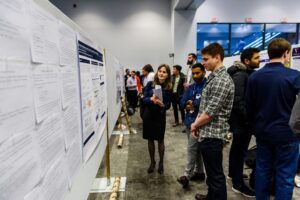
Le vendredi 22 février 2019, l’Institut Vecteur organisait son tout premier colloque de recherche et salon de l’emploi, l’un des plus grands rassemblements d’experts du domaine de l’intelligence artificielle au Canada. Cette journée a donné l’occasion aux chercheurs de Vecteur de présenter leurs meilleurs projets de recherche menés au cours de la dernière année. L’événement offrait en outre aux étudiants à la maîtrise, aux doctorants et aux stagiaires postdoctoraux dans les domaines de l’apprentissage automatique et de l’intelligence artificielle la chance de rencontrer les partenaires de Vecteur dans les secteurs de la technologie et de la santé, et de découvrir un large éventail de possibilités de stages et de carrières. Des représentants de 20 commanditaires et partenaires de Vecteur et plus de 300 participants s’étaient donné rendez-vous pour l’événement.
Lors du colloque, David Duvenaud, professeur à l’Institut Vecteur, a présenté son travail sur les équations différentielles ordinaires neurales, qui lui a valu le Prix de la meilleure communication lors de NeurIPS 2018, l’un des congrès phares consacrés à l’apprentissage automatique dans le monde. Hassan Ashtiani, ancien stagiaire postdoctoral au sein de Vecteur, a quant à lui présenté son travail visant à réduire la complexité de l’échantillonnage des modèles de mélanges gaussiens à l’aide de schémas de compression.
L’événement en chiffres :
- Plus de 300 participants, dont des étudiants à la maîtrise, des doctorants, des stagiaires postdoctoraux, des enseignants et des professionnels de l’industrie
- 100 étudiants inscrits à des programmes reconnus par Vecteur et 31 titulaires d’une bourse Vecteur en IA
- 56 affiches de recherche
- 20 commanditaires et partenaires de Vecteur issus des secteurs des technologies et de la santé, en quête de talents locaux dans le domaine de l’IA
Les participants étaient issus de la communauté étudiante et du corps professoral d’établissements canadiens et étrangers, dont les suivants :
- Université Carleton
- Institut de recherche Krembil
- Institut des politiques, de la gestion et de l’évaluation de la santé de l’Université Harvard
- Université McGill
- Université McMaster
- Mila
- Université Munzur
- Institut ontarien de recherche sur le cancer
- Smith School of Business de l’Université Queen
- Université Ryerson
- SickKids
- Université Simon Fraser
- Université de technologie de Chine méridionale
- Hôpital St. Michael’s
- Centre Sunnybrook des sciences de la santé
- Institut de réadaptation de Toronto
- Université de Montréal
- Universidad del Norte
- Réseau universitaire de santé
- Université de la Colombie-Britannique
- Université du New Hampshire
- Institut universitaire de technologie de l’Ontario
- Université d’Ottawa
- Université de Sao Paulo
- Université de Toronto
- Université de Waterloo
- UPC Barcelona
- Université Western (UWO)
- Schulich School of Business de l’Université York
Outre les communications, 56 affiches de recherche présentaient le travail publié par des chercheurs de Vecteur et des membres de la communauté de l’IA en 2018. Bon nombre d’affiches illustraient des recherches relayées par des congrès et des revues de renommée mondiale et portant sur des sujets comme le classement des types de cancer, l’identification des animaux ou la trajectographie haute précision.
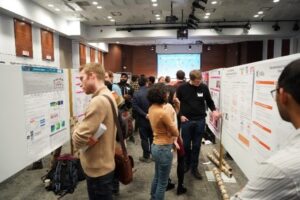
Au cours de la journée, les étudiants ont également pu rencontrer des représentants d’entreprises et de jeunes pousses établies au Canada, qui cherchaient à recruter des talents locaux en apprentissage automatique et en IA. Il s’agissait d’une occasion en or pour les commanditaires sectoriels de Vecteur, qui proposent des perspectives de carrière dans une foule de domaines allant de la science des données à l’analytique, en passant par l’ingénierie et la gestion de projet.
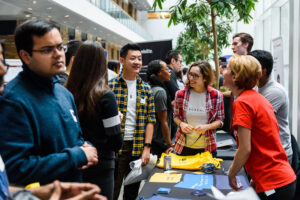
De nombreux commanditaires et partenaires de Vecteur issus des secteurs des technologies et de la santé étaient présents, dont :
- Accenture
- Air Canada
- Baycrest
- Borealis AI
- BMO Groupe financier
- CIBC
- Deloitte
- EY
- Intact Assurance
- Layer 6 AI
- Les Compagnies Loblaw limitée
- Manuvie
- NVIDIA
- ROSS Intelligence
- Banque Scotia
- Shopify Inc
- Stradigi AI
- Financière Sun Life
- Groupe Thales
- Thomson Reuters
Pour clôturer la journée, Craig Boutilier (Prix de la meilleure communication NeurIPS 2018, Google), Sheila McIlraith (Université de Toronto et professeure associée à l’Institut Vecteur), Brendan Frey (cofondateur de Vecteur, Deep Genomics) et Jamie Kiros (Google Brain) se sont prêtés à une vive discussion de groupe animée par le directeur de recherche de Vecteur, Richard Zemel.
Ces experts ont abordé les principaux obstacles auxquels se heurte l’apprentissage automatique et ont tenté de déterminer d’où viendront les prochaines grandes percées, évoquant les approches hybrides en matière de recherche sur l’apprentissage profond, l’interprétabilité et l’IA éthique.
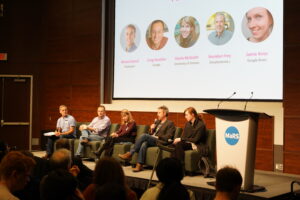
Faits saillants de la discussion
Principaux obstacles de l’apprentissage automatique
Le thème principal de la discussion était le retard de l’éthique sur les plus récentes avancées technologiques. Pour expliquer ce retard, les participants ont évoqué le fait que les travaux en apprentissage automatique sont cloisonnés par rapport aux autres domaines d’étude impliquant l’IA, ce qui pose de nombreux obstacles à la recherche. Les interactions modélisées étant peu intelligentes, les chercheurs ont encore du mal à comprendre comment ils peuvent en arriver à des interactions naturelles.
Approches de recherche hybrides sur l’apprentissage automatique (p. ex., modèles probabilistes et IA logique)
D’après les panélistes, bon nombre de techniques d’apprentissage automatique tirent parti d’approches hybrides fondées notamment sur les réseaux neuronaux. Les participants déplorent en outre le fait que certaines questions sont souvent négligées par la communauté scientifique, comme le recours aux algorithmes dans la prise de décisions influant sur le monde réel ou les avancées révolutionnaires en traduction automatique.
Interprétabilité
Les experts ont discuté de la transparence et du contrôle, qui expliquent à leurs yeux le besoin d’interprétabilité, mais aussi de la manière dont nous, humains, rationalisons généralement nos décisions après coup. Ils se sont interrogés sur la capacité d’un chercheur à comprendre précisément le fonctionnement d’un modèle. L’un des participants a en outre indiqué qu’un chercheur doit être en mesure d’expliquer les décisions prises au nom de l’utilisateur lors de la création d’un modèle. Vers la fin de la discussion, les participants ont rappelé la nécessité, pour les chercheurs, de tenir compte de l’utilisateur final dans leurs réflexions sur l’interprétabilité, car celle-ci peut varier selon le contexte.
IA éthique
Les experts ont fait valoir l’importance, pour les chercheurs, d’avoir des convictions solides susceptibles de les guider dans la conception d’algorithmes.
Ils ont également observé que les considérations éthiques ne se limitent pas à l’IA et qu’elles constituent un enjeu majeur dans d’autres domaines, dont l’informatique au sens large. À cet égard, les participants ont insisté sur la responsabilité des chercheurs, qui doivent former les étudiants et bâtir un avenir meilleur pour l’humanité. Ils ont ensuite soutenu que, devant le choix difficile des recherches à mener et les questions liées aux applications négatives d’un modèle, la frontière entre curiosité et danger reste très floue.
Concluant sur une note encourageante, les participants se sont réjouis des outils plus performants que jamais dont ils disposent pour s’attaquer aux défis évoqués au cours de la discussion. En réponse à la question d’un membre du public, l’un d’eux a rappelé que si les chercheurs doivent assumer le rôle de conseillers dans les discussions entourant les politiques publiques, la communauté scientifique ne doit pas être la seule à surveiller l’utilisation de modèles dans la prise de décisions.
Vector Institute’s Chief Scientific Advisor, Dr. Geoffrey Hinton, receives ACM A.M. Turing Award alongside Dr. Yoshua Bengio and Dr. Yann LeCun.
Written on . Posted in Toronto AI Organizations, Vector Institute.
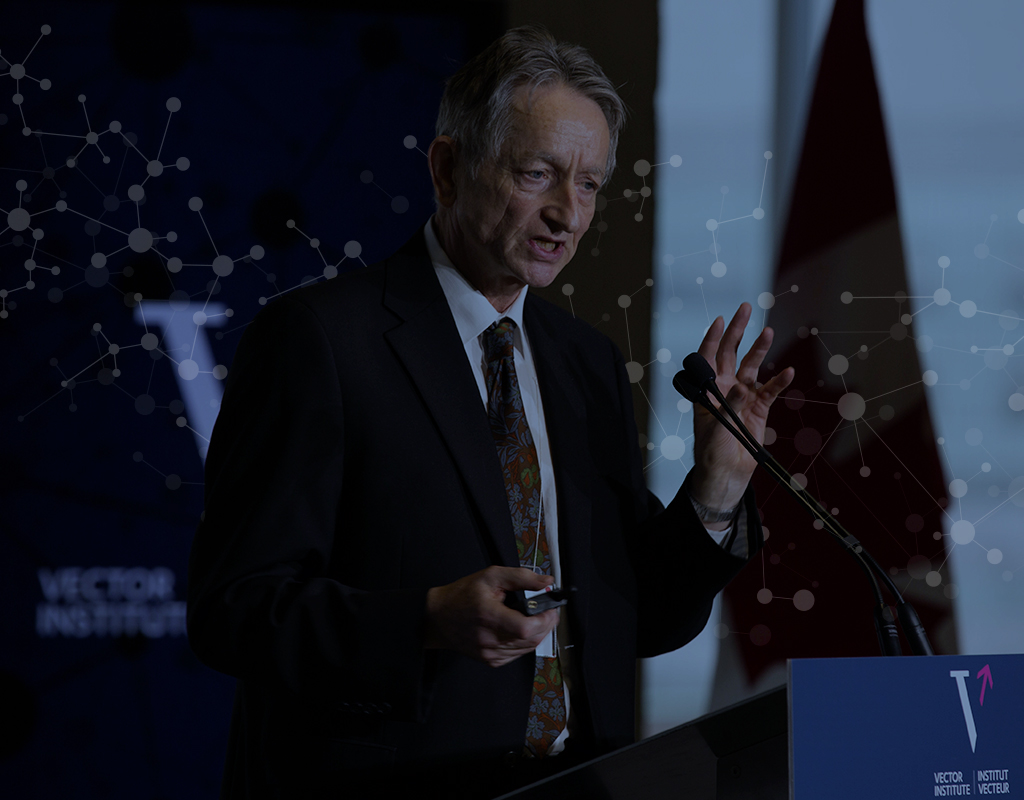
Today, Vector’s very own Chief Scientific Advisor, Dr. Geoffrey Hinton, received computer science’s top distinction, the ACM A.M. Turing Award, for his foundational research in deep learning, neural networks, and artificial intelligence (AI). Dr. Hinton is also VP and Engineering Fellow, Google, and Emeritus Professor, University of Toronto.
Along with Dr. Hinton, this year’s winners include fellow Canadian, Dr. Yoshua Bengio, and New York-based Dr. Yann LeCun, the latter of whom did his postdoctoral research with Dr. Hinton at the University of Toronto. Together, they are considered the founding fathers of deep learning. Like the award’s namesake, each one of them has pushed the boundaries of understanding and possibility in computing. And they have all made research advancements in Canada.
Introduced in 1966, the Turing Award is computing’s highest honour. The award celebrates scientists and engineers for propelling the field forward and making a significant technical impact. It comes with a $1 million, Google-sponsored prize.
As a Canadian-based researcher and Companion of the Order of Canada, Dr. Hinton – and the recognition he has received thus far – has shone an international spotlight on the revolutionary work in machine learning and AI being done right here.
Just two years ago, Canada became the first country to announce a national AI strategy, taking our place at the forefront of the field. More and more leading global companies, public institutions, and tech startups look to us to lead. Dr. Hinton and others continue to make great strides, and their influence extends well beyond the lab.
Since Vector’s inception in 2017, we have been among a series of catalysts for over $1 billion in AI and tech-related investments, which will result in the creation of 25,000 jobs across Canada. Over 240 researchers, encompassing faculty, postdocs, students, and affiliates, have become part of Vector’s community. And now we have a Turing Award winner amongst us.
The future of AI is bright, and Canada will play a major role in unlocking its potential.
“I am honoured to receive the ACM A.M. Turing Award, a high honour and recognition from the computer science community. Deep learning and neural networks have tremendous potential to revolutionize nearly every sector of society – from predicting aftershocks or floods to designing new materials and pharmaceuticals to interpreting medical images and personalized medicine. With the ever-increasing volume of data and computing capacity, industry has woken up to the transformational power of this technology. The Vector Institute is playing a unique role as a convener of academia and industry, enabling Vector’s researchers and industry sponsors to take bold steps and realize the full potential of the technology for which Yann and Yoshua and I are being recognized today. Together, we are ensuring Canadian companies and all Canadians benefit from ongoing research in the field.”
– Dr. Geoffrey Hinton, Chief Scientific Advisor, Vector Institute; VP and Engineering Fellow, Google; Emeritus Professor, University of Toronto
Researchers and professionals from coast to coast descend on Vector for first Research Symposium and Job Fair
Written on . Posted in Toronto AI Organizations, Vector Institute.


On Friday, February 22, 2019, the Vector Institute held its first-ever Research Symposium and Job Fair – one of the largest gatherings of machine learning talent across Canada. The one-day event showcased top research produced by Vector researchers over the last year. The event was an opportunity for local master’s students, PhD students and post-docs in the fields of machine learning and AI more broadly to connect with Vector’s industry and health partners and to discover a wide range of internship and career opportunities. The event, tailored for Vector’s indsutry sponsors and research community, had representatives from 20 Vector industry sponsors and health partners and over 300 attendees.
The symposium featured a presentation by Vector Faculty Member, David Duvenaud, on Neural Ordinary Differential Equations, work that was recognized with a Best Paper Award at NeurIPS 2018, which is one of the world’s largest flagship machine learning conferences. Hassan Ashtiani, previously a Postgraduate Affiliate at Vector, gave a presentation on Settling the sample complexity of GMMs via Compression Schemes.
Vector Research Symposium & Job Fair by the numbers
- 300+ attendees including master’s, PhDs, post-docs, faculty, and industry professionals
- 100 students currently enrolled in Vector- recognized programs and 31 Vector Scholarship in AI recipients
- 56 research posters
- 20 Vector Industry Sponsors and health partners with booths seeking to hire local AI talent
For job-seekers and researchers with expertise in machine learning and AI from across Canada, Vector’s Research Symposium & Job Fair was the place to be to expand their networks and meet potential collaborators or employers. Attendees included students and faculty from institutions across Canada and abroad, including:
- Carleton University
- Krembil Research Institute
- Harvard University
- Institute of Health Policy, Management and Evaluation
- McGill University
- McMaster University
- Mila
- Munzur University
- Ontario Institute for Cancer Research
- Queen’s University and Smith School of Business
- Ryerson University
- Sick Kids
- Simon Fraser University
- South China University of Technology
- St. Michael’s Hospital
- Sunnybrook Health Sciences Centre
- Toronto Rehabilitation Institute
- Université de Montréal
- Universidad del Norte
- University Health Network
- University of British Columbia
- University of New Hampshire
- University of Ontario Institute of Technology
- University of Ottawa
- University of São Paolo
- University of Toronto
- University of Waterloo
- UPC Barcelona
- Western University (UWO)
- York University and Schulich School of Business
In addition to the presentations, 56 research posters were on display, featuring work published by Vector researchers and the surrounding AI community in 2018. Many posters featured research that had been accepted by world-renowned conferences and journals and included topics ranging from classifying cancer types and animal identification to high accuracy trajectory tracking. For industry attendees, the poster sessions were an exclusive opportunity to gain exposure to a large concentration of Vector’s local machine learning faculty, graduate students and affiliates working on the latest machine learning advancements.

Throughout the day, students were also able to network with Canadian-based enterprises and startups seeking to hire machine learning and AI talent locally — an exclusive opportunity for Vector’s industry sponsors. Job openings ranged from opportunities in data science, analytics, and engineering, to project management.

Several of the Vector Institute’s industry sponsors and health partners who are at the forefront of AI adoption in Canada were present the Job Fair, including:
- Accenture
- Air Canada
- Baycrest
- Borealis AI
- BMO Financial Group
- CIBC
- Deloitte
- EY
- Intact Insurance
- Layer 6 AI
- Loblaw Companies Ltd.
- Manulife
- NVIDIA
- ROSS Intelligence
- Scotiabank
- Shopify Inc
- Stradigi AI
- Sun Life Financial
- Thales Group
- Thomson Reuters
To wrap up the day, there was a lively panel discussion with Craig Boutilier (NeurIPS 2018 Best Paper winner, Google), Sheila McIlraith (University of Toronto and Vector Faculty Affiliate), Brendan Frey (Vector Co-founder, Deep Genomics), and Jamie Kiros (Google Brain), moderated by Vector’s own Research Director, Richard Zemel.
The panel explored big challenges facing machine learning and where the next breakthroughs will come from, diving into topics such as hybrid approaches to deep learning research, interpretability, and ethical AI.

Panel Highlights
The big challenges facing machine learning
The main theme of the panel was how ethics is currently lagging behind recent technological advancements. It was discussed how one of the causes is due to machine learning research being siloed from other fields of study where AI is applied, which presents multiple hurdles when conducting research. According to the panelists, another challenge facing machine learning is the fact that interactions in models are not very intelligent, and understanding how to have natural interactions remains a big challenge in research.
Hybrid approaches to deep learning research (i.e., probabilistic models and logical AI)
Panelists explained that a lot of machine learning techniques take advantage of hybrid approaches that include neural nets as a component. The panel also discussed how, in general, the research community does not talk enough about topics such as algorithms supporting real world decision-making and how machine translation revolutionized the field.
Interpretability
With respect to interpretability, the panel discussed how trust and control are the reasons behind the need for interpretability and how we usually rationalize decisions post-hoc as humans. This led to the question of a researcher’s ability/inability to know exactly what is happening in a model. In addition, one panelist explained that when creating a model, the creator should be able to explain decisions made on behalf of the user. Towards the end of the discussion, it was noted that researchers should have the end user in mind when thinking of what interpretability means because it can change in different contexts.
Ethical AI
The panelists talked about how it is important for researchers to have a solid belief architecture to orient them when designing algorithms.
It was also noted how ethical considerations are not unique to AI. Rather, it is an important issue in other fields, including computer science more broadly. To that end, the panelists expressed that researchers have a responsibility to educate students and build towards a better future for humanity. It was also noted that when faced with hard decisions on what should be researched, and questions about possible negative applications of a model, there is uncertainty about where a line should be drawn to account for a curiosity-danger tradeoff.
Ending on a positive note, the panel expressed that we now have better tools than ever before to take a shot at tackling the big challenges that were discussed. In response to an audience question, it was mentioned that although researchers should participate in an advisory role in public policy discussions, it should not be exclusively the scientific community that gates usage of models in decision-making.
VECTOR INSTITUTE WELCOMES NEW POSTGRADUATE AFFILIATES TO ITS GROWING RESEARCH COMMUNITY
Written on . Posted in Toronto AI Organizations, Vector Institute.
March 25, 2019
The Vector Institute congratulates the newest members of its research community on being accepted into the 2019 Vector Institute Postgraduate Affiliate Program. Established in 2018, the program is intended to promote engagement and collaborations among researchers who are early in their careers, with the broader artificial intelligence (AI) community.
Vector’s new Postgraduate Affiliates (consisting of graduate students or postdoctoral fellows) will join a vibrant community of innovative problem solvers, bringing with them expertise in cancer genomics, computer vision, hardware, medical imaging, nanobiophysics, optimization, radiation, smart home systems, robotics and quantum physics. They hail from a broad cross-section of Ontario universities and institutions including the Ontario Institute for Cancer Research, Princess Margaret Cancer Centre, Ryerson University, Hospital for Sick Children, Toronto Rehabilitation Institute, University of Ontario Institute of Technology (UOIT), University of Toronto, University of Waterloo and Western University.
Vector received an overwhelming response to our call for applications, and competition for the limited number of positions was fierce. Applicants were evaluated and selected according to the strength of their past research contributions and the alignment of their interests with Vector’s vision, mission, and research strengths. The acceptance rate for the 2019 program was 8.6%, demonstrating the high caliber of researchers within the incoming cohort.
The new Postgraduate Affiliates will work alongside continuing members of the 2018 program cohort. The Vector Institute is also excited to celebrate the successes of graduating members of the 2018 Postgraduate Affiliates Program who have gone on to accept positions at leading tech companies in Canada such as RBC Borealis, Thales and Intel, as well as faculty/scientist positions at McMaster University, the Toronto Rehabilitation Institute and the University of Manitoba.
Learn more about the Vector Institute Postgraduate Affiliate Program.
Welcome to the 2019 Vector Institute Postgraduate Affiliates
Anastasia Razdaibiedina, University of Toronto
Anjali Silva, Princess Margaret Cancer Centre – University Health Network
Anna Golubeva, University of Waterloo – Perimeter Institute
Buser Say, University of Toronto
Kyle Mills, University of Ontario Institute of Technology
Lee Clement, University of Toronto
Lydia Y. Liu, Ontario Institute for Cancer Research
Lina Tran, The Hospital for Sick Children
Marie-Julie Favé, Ontario Institute for Cancer Research
Martin Magill, University of Ontario Institute of Technology
Matthew Giamou, University of Toronto
Matthew J. S. Beach, University of Waterloo – Perimeter Institute
Md Amirul Islam, Ryerson University
Michael Ridley, Western University
Muhammad Raisul Alam, University of Toronto
Rafid Mahmood, University of Toronto
Sayeh Sharifymoghaddam, University of Toronto
Xingyu Li, University of Toronto
Zhaleh Safikhani, Princess Margaret Cancer Centre – University Health Network
About Research at Vector Institute:
Since its launch in 2017, the Vector Institute has grown into a community of more than 260 researchers, including faculty, postdocs, students and affiliates. Over the last year, they have published more than 100 papers, many featured in top machine learning conferences and journals. Vector researchers often receive top awards for their scientific contributions and have been named as top innovators on Canada’s Top 40 Under 40 list and by MIT Technology Review. Together, they are working to achieve Vector’s vision to drive excellence and leadership in Canada’s knowledge, creation, and use of AI to foster economic growth and improve the lives of Canadians.